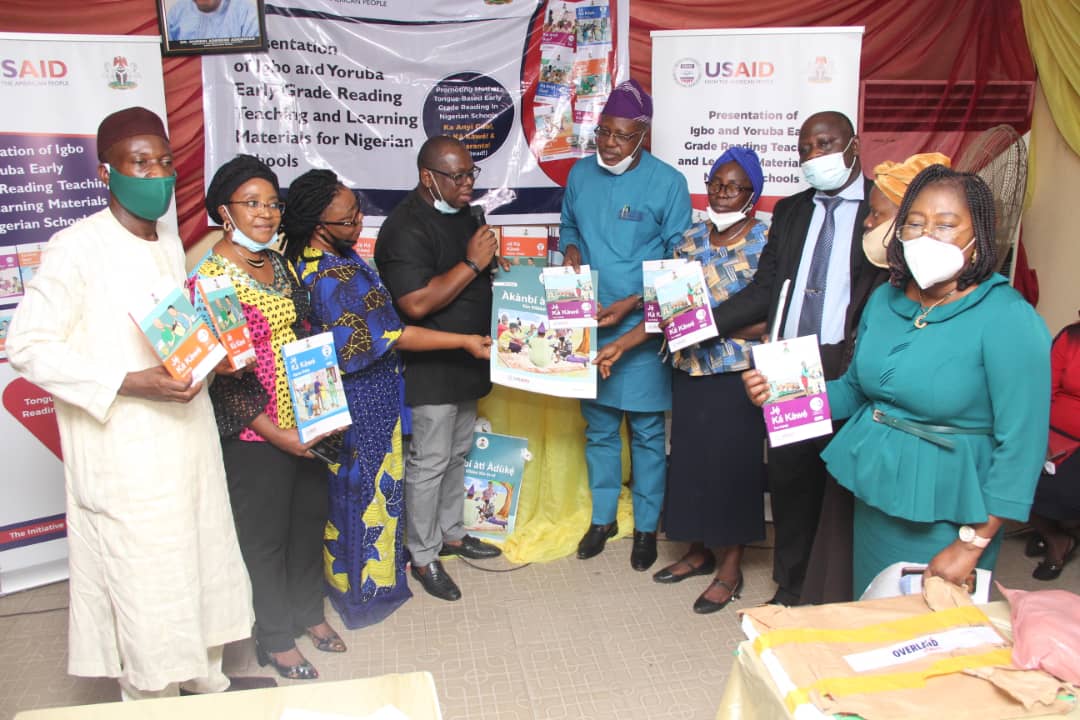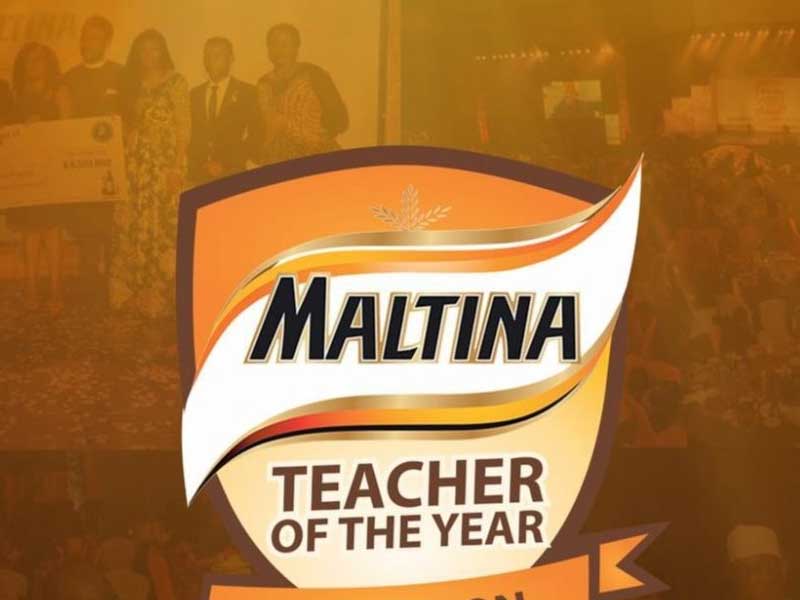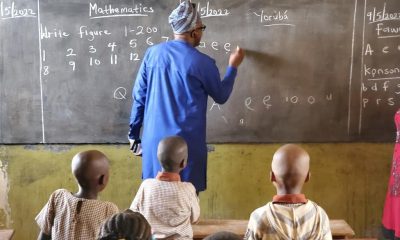Education
USAID Shares Textbooks to Public Schools in Oyo to Boost Reading Skills

By Aduragbemi Omiyale
In order to improve the reading skills of children in Oyo State, the United States Agency for International Development (USAID) has distributed textbooks in public schools.
The agency hopes to disburse over 10,000 textbooks to nearly 2, 450 public schools in the state.
At the ceremony held last Friday at the Oyo State Universal Basic Education Board (Oyo SUBEB), the USAID Northern Education Initiative Plus Chief of Party, Mr Nurudeen Lawal, handed over copies of Yoruba Early Grade Reading materials Je Ka Kawe to the Executive Chairman of Oyo SUBEB, Mr Dr. Nureni Adeniran.
The executive chairman said the Oyo State Government remains committed to investing in the future of children in public schools through education.
He thanked the United States Government for being a worthy partner in the Mr Seyi Makinde-led administration’s vision to ensure all children learn to read and write fluently, especially in their mother tongue.
“Every child deserves quality basic education and we thank The United States, who we believe is a proud partner with the Oyo State Government.
“They have invested in the future of our children who will grow to make a positive contribution in their communities,” he said.
Mr Adeniran said the Oyo State Government from inception was committed to increase budget allocations to improve basic education, adding that this has also yielded in USAID providing technical assistance and support to the State.
He promised that the state government would reach its goal of improved education for children and more effective and efficient management of the entire education system.
Speaking earlier, the leader of USAID delegation, Nurudeen Lawal said the agency was committed to ridding African nations of out-of-school-children, and to ensure they access education.
He noted that the importance of the mother-tongue cannot be over flogged, hence the mass production of Je ka kawe which he noted will boost the literacy level of children and youths.
Mr Lawal revealed that the success of Let’s Read and Mu Karanta in the Northern part of Nigeria inspired the initiative for Je ka kawe for South Western Nigeria and Ka Anyi Guo for South Eastern Nigeria.
He added that the development of Je ka kawe was premised on the language provisions in the National Policy on Education, that the mother-tongue of the immediate community should be the medium of instruction at the lower primary level of education.
The Chief of Party said the initiative seeks to reach 1.6 million children in grades P 1-3, along with more than 500,000 out-of-school-children and youth attending some community learning centres.
“The program will train and equip teachers and learning facilitators who can reach children in schools and non-formal learning centres,” he said.
The books were developed by Language Experts with the support of local professionals from the Board. It contains stories and pictures that promote positive social values, written in Yoruba language for Primary 1, 2 and 3.
The event was witnessed by the Permanent Secretary, Ministry of Education, Science and Technology, Mrs Aminat Atere, Directors from the Ministry; Representatives of Nigeria Union of Teachers; Association of Primary Schools Head Teachers of Nigeria; Reading Advisors from USAID among other stakeholders.
Education
Organisers Extend Deadline for 2025 Maltina Teacher of the Year Entries

By Modupe Gbadeyanka
The deadline for entries for the 2025 Maltina Teacher of the Year competition has been extended to Friday, September 5 from Friday, August 22, a statement from the organisers has revealed.
The prestigious event, organised by Nigerian Breweries Plc, is used to celebrate teachers from across the country.
Now in its 11th edition, the Maltina Teacher of the Year award has become a coveted prize for the teaching industry in Nigeria.
The Corporate Affairs Director for Nigerian Breweries, Mr Uzodinma Odenigbo, explained that the decision to extend the deadline by two weeks was in response to requests from teachers who asked for additional time to complete their submissions.
“We’ve received significant interest from teachers across the country who requested more time to prepare and submit their entries. This extension is to ensure that as many deserving teachers as possible can participate,” Mr Odenigbo said.
“The 11th edition of the Maltina Teacher of the Year initiative is open to all secondary school teachers currently teaching in Nigeria. The competition remains an effective intervention program geared towards giving pride to the teaching profession and improving the education sector in Nigeria as a whole,” he added.
Mr Odenigbo noted that eligible teachers interested in taking part in the competition are to log on to www.maltinateacheroftheyear.com to complete their application online. Alternatively, they can download the form and send the completed form via email to maltinateacheroftheyear@heineken.com.
He reiterated the commitment of the company to rewarding teachers, stating that the overall winner for the competition would receive a trophy, a total cash prize of N10 million, a capacity development training abroad, and a school infrastructure project worth N30 million in his/her school.
“The first runner-up of the competition will equally receive a trophy and a sum of N5 million, while the second runner-up receives a trophy and N3 million. All state champions will be rewarded with recognition plaques and a cash prize of N1 million each,” he added.
The Maltina Teacher of the Year initiative was established in 2015 and is funded through the Nigerian Breweries-Felix Ohiwerei Education Trust Fund, which was set up in 1994 to facilitate an active contribution to the development of the education sector in Nigeria in line with the United Nations Sustainable Development Goal (SDG) number 4.
Education
Efiwe Makes Coding Easier to Learn

By Modupe Gbadeyanka
A mobile platform tailored to transforms the way people learn to code by combining interactive challenges and real-time AI-powered feedback has been launched.
The application, Efiwe, a mobile-first and AI-driven platform that allows anyone to master coding directly from a smartphone, was created to make coding accessible to all
It offers comprehensive training in HTML through hundreds of structured challenges, with CSS and JavaScript set to follow soon.
The platform, launched on Saturday, August 16, 2025, is embedded with an adaptive AI tutor, which analyses learner’s progress, prioritises errors, predicts helpful hints, and adjusts the pace of lessons. The AI doesn’t just point out mistakes, it personalises the journey, ensuring that each learner is challenged but never overwhelmed.
According to the founder of Efiwe, Mr Chidi Nwaogu, the platform was borne out of a clear signal of the urgent global demand for more inclusive and accessible coding education.
He said through Efiwe, learners can be guided step by step to build a professional website from scratch, moving from a blank page to a polished project without the need for a computer or additional software, noting that by focusing on mobile accessibility, Efiwe ensures that coding education is no longer limited by device or geography.
The platform’s offline capability, powered by lightweight on-device AI models, is one of its most groundbreaking features. Once loaded, Efiwe can function without an internet connection, allowing learners in regions with limited or expensive connectivity to continue their coding journey uninterrupted. Its multilingual support in 33 languages further broadens accessibility, making it a truly global solution.
“We believe coding education should be fun, accessible, and effective — and that’s what Efiwe delivers.
“With over 33 languages available and a fully offline mode, we are breaking down barriers and giving people from all backgrounds the chance to learn how to code. Whether you’re a complete beginner or an aspiring developer, Efiwe is here to help you grow,” Mr Nwaogu stated.
“Efiwe is built on the belief that anyone, anywhere, should be able to start their coding journey. By making it mobile-first and offline-ready, we’re especially empowering learners in regions where internet access is limited or costly. Efiwe is proof that technology can bridge the global digital divide,” he added.
Education
NELFUND Disburses N86.3bn to 449,039 Students in 15 Months

By Adedapo Adesanya
The Nigerian Education Loan Fund (NELFUND) has announced the disbursement of a total of N86.3 billion loan to 449,039 students since the scheme was launched on its portal on May 24, 2024.
According to the latest daily status report released on Monday, August 11, 2025, the scheme disbursed the loan as of August 6, 2025.
The fund noted that “the scheme delivers on President Bola Tinubu’s Renewed Hope Agenda of empowering every Nigerian student through access to higher education funding.”
It said the disbursement included N47,629,338,384 paid directly to 218 institutions as tuition fees and N38,718,120,000 given to students as upkeep allowances.
The report further revealed that 731,140 students have registered on the loan portal, out of which 720,732 have successfully applied for loans — representing a 98 per cent application success rate.
Data from the dashboard shows a daily increase of 933 in the number of successful registrants and an additional 1,094 successful applicants.
The update was necessitated by concerns over alleged misconduct threatening the integrity and transparency of the student loan scheme established under the Student Loans (Access to Higher Education) Act, 2024.
There have also been cases of students who have graduated still receiving loans, as well as loan payments to institutions even after students have paid their fees as well as collusion between some tertiary institutions and financial institutions to delay, divert, or conceal student loan disbursements.
-

 Feature/OPED6 years ago
Feature/OPED6 years agoDavos was Different this year
-
Travel/Tourism9 years ago
Lagos Seals Western Lodge Hotel In Ikorodu
-

 Showbiz3 years ago
Showbiz3 years agoEstranged Lover Releases Videos of Empress Njamah Bathing
-

 Banking7 years ago
Banking7 years agoSort Codes of GTBank Branches in Nigeria
-

 Economy2 years ago
Economy2 years agoSubsidy Removal: CNG at N130 Per Litre Cheaper Than Petrol—IPMAN
-

 Banking2 years ago
Banking2 years agoFirst Bank Announces Planned Downtime
-

 Sports2 years ago
Sports2 years agoHighest Paid Nigerian Footballer – How Much Do Nigerian Footballers Earn
-

 Technology5 years ago
Technology5 years agoHow To Link Your MTN, Airtel, Glo, 9mobile Lines to NIN























